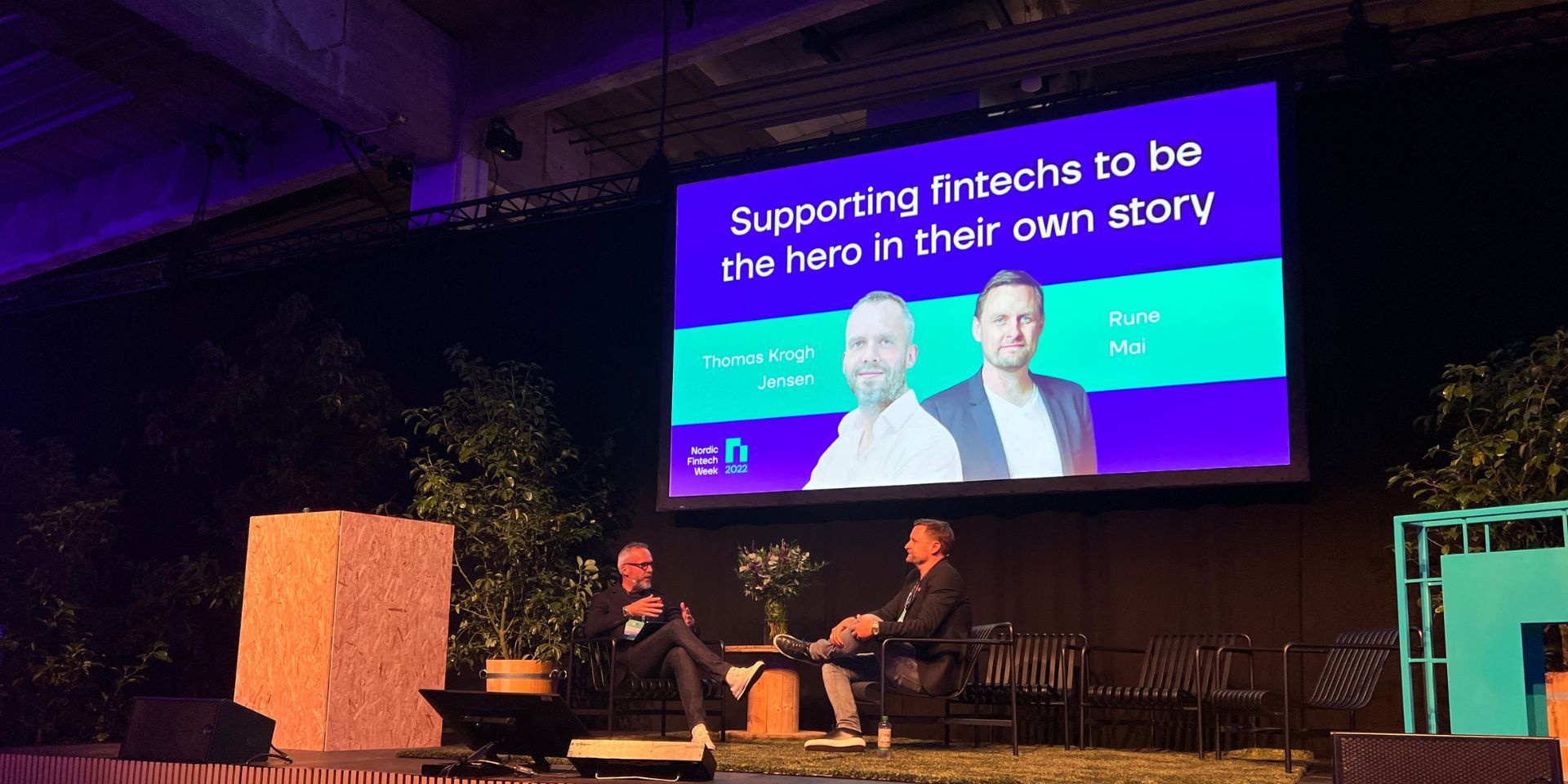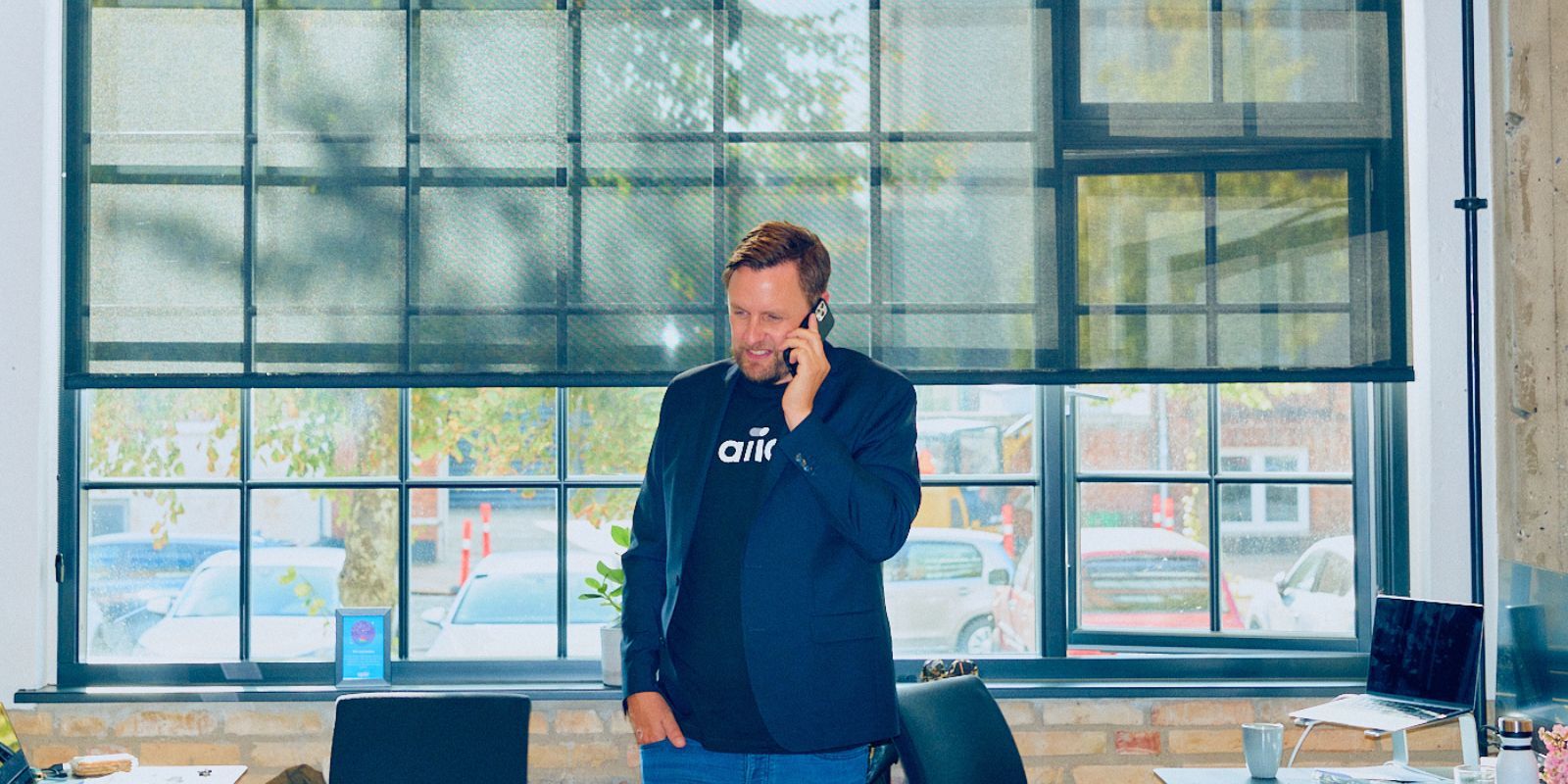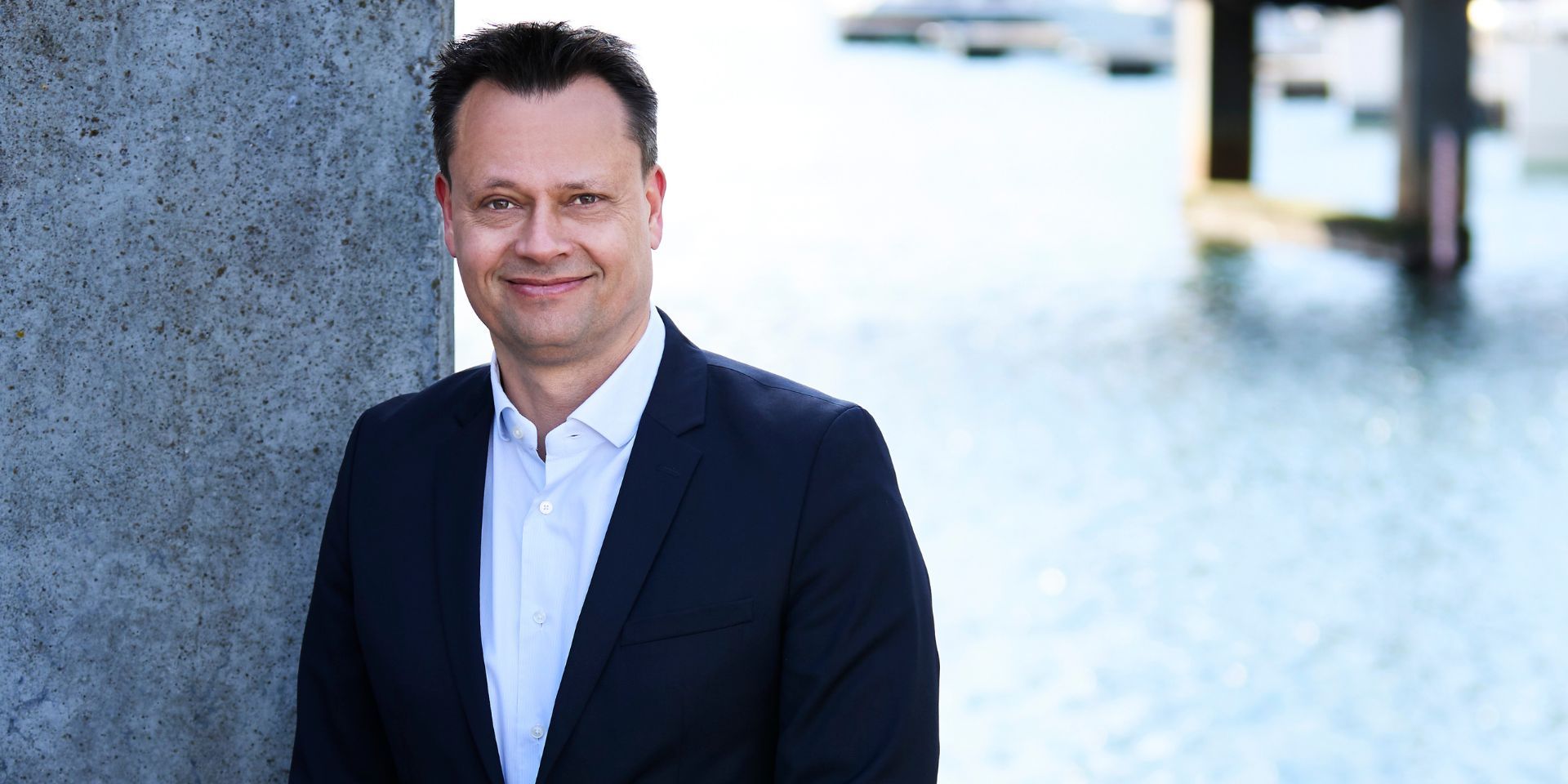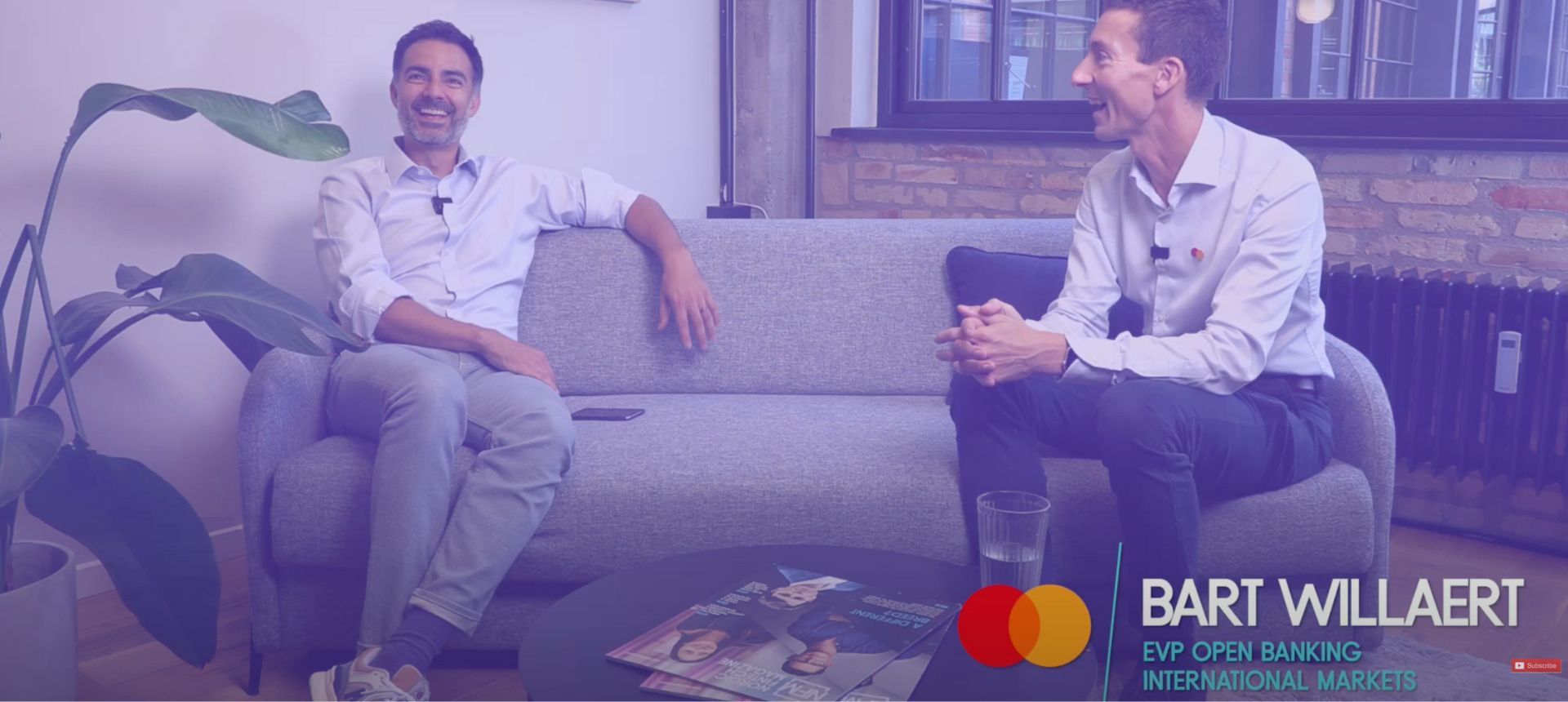
Supporting fintechs to be the hero in their own story
December 28, 2022 | Louise Basse
With more than a decade of experience in the fintech space, the Co-founder and former CEO of Aiia, Rune Mai, recently took the main stage at Nordic Fintech Week. Rune Mai gave a talk about his journey in fintech and how the Mastercard acquisition of Aiia last year has opened up a new world of opportunities to support prosperous fintech journeys.
In case you missed out on the talk, we’ve created a recap of the discussion between Rune Mai and the CEO of Copenhagen Fintech, Thomas Krogh.
So get comfortable, grab a coffee and enjoy the journey.
Thomas Krogh: Would you like to start off by taking us through the journey from the early days of creating the personal finance management app Spiir and then being acquired by Mastercard last year?
Rune Mai: It’s actually a full-circle story. Just before I created Spiir in 2010, I was working for the big multinational corporation, eBay. I decided to create Spiir because I was looking a lot at the way we lend money and the way we approach the digital space, which was fairly new even in 2010. In regards to that, I was surprised how little people were getting out of their financial data that was stored in the bank.
Therefore, I envisioned a service where we could use the financial data to generate beneficial services for the end user – in terms of understanding money and money habits. All of that became Spiir. We launched in 2011 and quickly gained 120,000 users without doing any marketing. Those users were only generated with press awareness and the whole rightfulness of things.
At that time, we were one of the first account aggregators in the Nordics that was doing these things with financial data. We quickly realised – and especially upon user request – that people wanted this to be automated. Before, people were using CSV files that they exported from the banks and then uploading them to a service manually. That effectively cut us off from being on mobile platforms.
In that way, we started experimenting with how we could build the connectivity to the banks ourselves, as well as how we could work with banks to do so. We entered a partnership with Lån&Spar bank in Denmark in 2011, where they were automatically transferring data to the Spiir platform – that was a first of a kind at that time. For the rest of the banks, we ended up building our own nets. We built a version where we used the APIs that the banks were using themselves to present data in the mobile bank. That led to connectivity and we wanted to build that really well because we had a service that was dependent on it, so the quality of the connectivity was super important.

In 2016 and 2017, we started focusing on how the technology behind Spiir could help other use cases as well. Since we started building the platform, the data just kept growing, and the need to massage that data into meaningful services – for you and me to be able to execute on life more effectively – became the goal. That’s why Netflix and all the others became so successful; they actually solved the issue of channels and flow TV. So we tried to figure out how we could build something for others so they could easily build services like that in the financial services industry.
That’s why we started Nordic API Gateway, and why we moved from B2C to B2B models, reselling the connectivity from ourselves to others. That business started growing really fast, and today, it’s what we call Aiia – the company that was acquired last year by Mastercard.
Thomas Krogh: So looking at that journey from Spiir to Nordic API Gateway to Aiia and now being acquired by Mastercard, what would you have liked to have done differently?
Rune Mai: That’s a hard question to answer because it’s not like you’re doing everything on purpose when you build a company. Sometimes it’s about staying alive until the sun and the moon and the stars are positioned exactly right.
We started out as a strategic investment case and we actually took in massive amounts of capital from strategic investors, including Danske Bank and DNB who co-owned the project with us. We did that for a reason; we wanted to build something for the industry together with the industry. We didn’t want to build our platform in opposition to the industry, as we saw a lot of other aggregators doing.
At the same time, we were executing things quickly and we were moving fast. I’m not regretting it, but that was probably the most stressful part of our journey; making sure we could grow our company and still reporting correctly to our large-scale owners who had their own compliance systems and background that we needed to adhere to.
Thomas Krogh: So what is it that makes Aiia special? Why did a big corporation like Mastercard end up acquiring Aiia?
Rune Mai: I’d say because of two main things. First of all, the DNA of being a third party provider in the open banking space was super interesting to Mastercard because it means we’re a fintech startup that actually consumes data on the B2B part.
The other part was the focus we had on the rails. Everyone seems to very quickly talk about bank connections as something that is trivial. But guess what? If you take a train ride on bad rails, everything you focus on is the bumpy ride. It doesn’t matter if you build a first class train experience because no one will notice if the train is bumping along and going super slow.
It is very comparable to laying out phone nets, as it’s the same kind of hard work. It’s not just plugging in some plugs and then everything works. There’s compliance, there’s technology, there are companies that really don’t understand the business cases yet, and you need to manage all of these things to make sure that you solve problems.
Thomas Krogh: Now, Aiia has become a part of Mastercard which is a major corporation. How does that enable you to enable other fintechs to be heroes in their own journey?
Rune Mai: First of all, I think the power of many is obvious to everybody. Mastercard is a huge company. In open banking alone, we’re now a team of 2000 people jointly working on the agenda. That’s just a totally different size of operation than I could have managed to build myself with the funding I had. So, getting to that place and that size and operational level has been super important for us to win, not only in Europe but also around the globe.

The other part is how many are selling the solution. We have more than a thousand people doing sales in Europe. My sales team back in the days was obviously very small compared to that. These things will of course mean a lot when addressing the markets out there, but it is not everything.
Some people will say that this is just corporate stuff – and it is; that’s the power of many. But on top of that – as you’ve seen with Copenhagen Fintech – we actually doubled our sponsoring of the fintech ecosystem because we find that extremely important.
Not only because we have money to do so, but because we can also learn from the ecosystem. That helps us to look at things like what the next big thing is, and how open banking or other rails actually fit in with a specific use case and support the growth.
If you want to know more about how Mastercard’s multi-rail mindset can help scale your business, please feel free to reach out to us. If you’re looking for more information on how open banking can power a wide range of use cases, head over to our knowledge hub.




